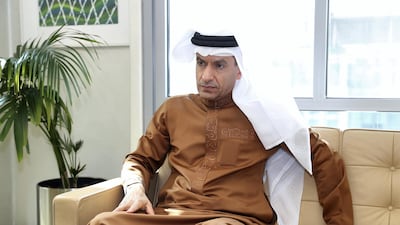Deutsche Bank, the biggest German lender, expects up to 15 per cent year-on-year growth in revenues from its operations in the Middle East and Africa after a softer 2018. It is also bullish on growth prospects of businesses in Saudi Arabia and the UAE, its regional chief executive said.
"We met our [2018 revenue] targets but it was a soft year and the business activity [in general] in the region was also soft, but the bank outperformed in the UAE market," Jamal Al Kishi told The National, but did not the anticipated revenue figure for this year.
Deutsche Bank, which has cut jobs globally, is restructuring its business lines and prioritising markets it intends to remain in, was focused on managing costs in MEA region last year, he said.
Lenders in the region are expected to boost profitability this year, especially in the Arabian Gulf, amid higher economic growth and rise in government spending. Rating agency Moody's Investors Service assigned Gulf banks a stable outlook in December on the back of improving operating conditions, strong capital and solid lending.
“Saudi and the UAE remain the key large markets for Deutsche Bank and there’s a great deal of [business] activity in both,” Mr Al Kishi said. “There was significant growth in the UAE in 2018 and Saudi Arabia had a fairly good year, but the growth there was not as buoyant as we were hoping for, for understandable reasons."
He expects Deutsche Bank’s business in both markets to grow further as the pace of economic activity picks up in the UAE and Saudi Arabia.
The bank is engaged in discussions with private sector companies and government-related entities in Saudi Arabia for large ticket-financing deals and expects some of them to come to the market this year. Deutsche Bank is also involved in some of the mergers and acquisitions and the advisory deals in the kingdom as it looks to capitalise on the opportunities arising from the country's economic transformation plans.
“Our clients are looking at both debt capital markets and bank loans. They are looking at a range of options,” he said of a large financing for a government-related entity, without naming it. “They [the clients] hold the key on timing but I do anticipate deals fairly soon and some of these are linked to progress of other transactions they are pursuing at present,” he said.
Saudi Arabia, the region’s biggest economy and the top oil exporter in the world, is going through an economic overhaul to cut its dependence on oil, sale of which accounts for the majority of its revenues. Riyadh plans to privatise some of the state-owned companies including the public listing of oil and gas giant Saudi Aramco, once it completes its acquisition of a 70 per cent stake in Saudi Basic Industries Corporation, the top petrochemicals producer in the Middle East. Aramco may raise large debt to finance the acquisition of Sabic.
Mr Al Kishi also expects more financing deals this year in the UAE.
“It will be perhaps in the sovereign space and some of the quasi-sovereign entities. Clients talk about ratings when they are about to do something in the capital markets, in particular,” he said without giving further details on timing or size of the deals.
Abu Dhabi National Oil Company, the state-controlled oil and gas company, last week received an AA+ rating from Fitch, the highest standalone rating for an energy company in the world, which analysts said would open doors for cheaper financing for the parent company and its subsidiaries.
“Now is not a bad time to tap the markets. They are liquid and rates are low, historically speaking, so why not lock in the capital that you require," Mr Al Kishi said.
In terms of growth, Deutsche Bank expects all streams of its business to get a boost in 2019.
“We did extremely well in our global markets, wealth management and in our transaction banking business – the three main pillars of our operations in both the UAE and Saudi,” he said. "We expect the same trend in 2019.”
The bank has already expanded its investment banking team, along with the wealth management team. It has also added more people to the transaction banking side.
“You will see more people focusing on the core markets of Saudi Arabia, UAE and places like Egypt, which has been a very good story for Deutsche Bank,” Mr Al Kishi said. “If the picture remains as positive as we think it is, it will be the catalyst for further investments [into human capital] in the UAE and wider region.”
The bank, which is also bullish on Africa growth plans, will further strengthen its transaction banking, debt capital market and wealth management businesses in the continent. Deutsche Bank is involved in several financing transactions with sovereign and quasi-sovereign entities, he said.
“Places like Egypt for example, are a buzz with a lot of activity and we are engaged [in transactions].”


